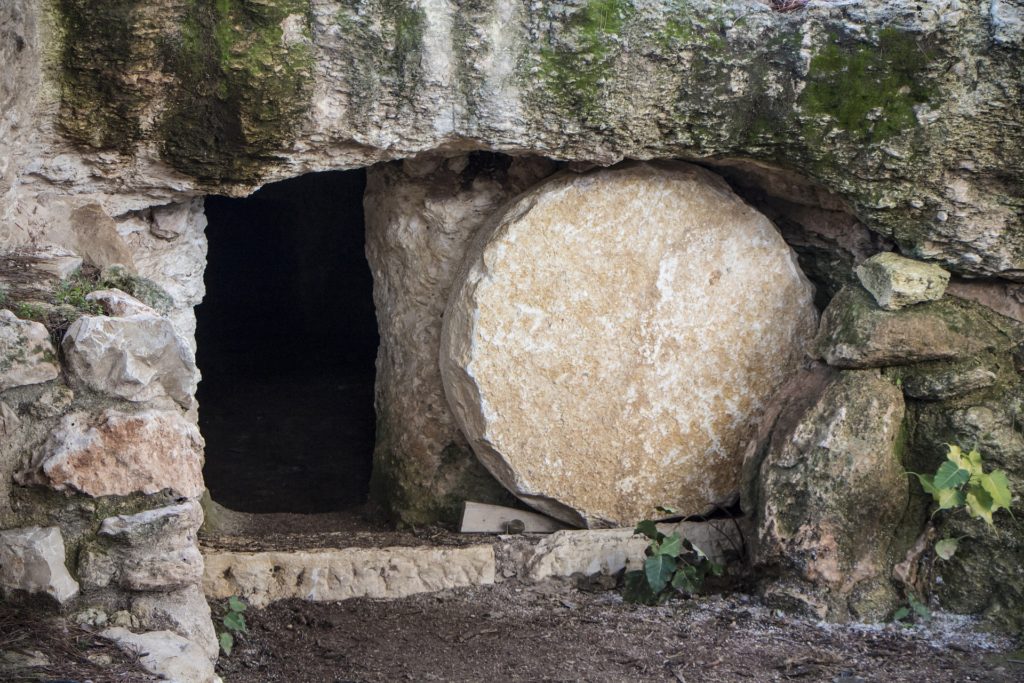A Modern-day Easter Story
“Faith for a miracle is easier to come by than trusting the Lord when no miracle happens.” – Margaret Graham
I began digging my grave just short of two decades ago. The first thrust of the shovel into the ground came on a day that started out as ordinary.
By the end of the day, the point of the shovel penetrated the ground in my heart multiple times and in shock, I twisted the shovel in the ground before yanking out dirt in a hole that was to become bigger and bigger.
As someone who knows despair, I have lost the need to compare it to others’ anguish.
Suffering is suffering so I feel it would be an injustice to give too many details to my situation lest the reader is tempted to compare. Despair needs no comparison and the hard truth is, it can lead to death.
Weeks passed while I lived with the agony of my situation. Each day, I thrust the shovel into the ground and lifted out more dirt.
My grave took on the shape needed for my coffin. First thing in the morning, I’d cry, God, help me. I felt no help in the silence. My shovel went down into the dirt and I lifted out a mound.
When I stood alone in my classroom, I’d plead, God, please save me. Silence and another shovelful of dirt. I’d enter a room on break and people quickly left and I assumed it was because they couldn’t stand to see such raw emotion radiate from me.
I’d stand alone and cry, Jesus, come because I am so alone. The loudest silence of all met my words. In my solitude, I dug my grave a little deeper.

I spent lunchtimes alone in my classroom because I couldn’t eat and I was ashamed for anyone to see this.
I’d cry, Jesus, you say you are
the Bread of Life. Please, feed me. Silence again and in my starvation, I continued to dig my grave.
At the end of each day, when my despair swept over me the strongest, I walked alone, sure God’s silence was because I was a failure; he had to be so disappointed in my lack of faith. My grave was getting close to six feet deep.

The day God broke his silence did not differ from the days of turmoil that preceded. In my high school Bible class, I was teaching the death of Lazarus
found in John 11. I was not prepared for the gut-wrenching reaction I would have while reading familiar words aloud.
I knew the story of Mary, Martha and Lazarus by heart but that day, I wasn’t reading about them, I was reading about me.
As I stood before my kids, tears pooled and overflowed from my eyes as my voice caught reading Martha’s honest accusation. “Lord… if you had been here, my brother would not have died.” (John 11:21)

In the silence within my classroom, Martha’s words reflected mine. Lord, if you had only been here!
I added my own silent accusation. But you have remained silent! I was hurt. I was distraught. I was overwhelmed. I was confused. As I died on the inside, I had stepped closer to the grave I had dug.
All these things must have passed through the sisters’ hearts in some form or another.
For Mary and Martha, their heartache began with their dear brother, Lazarus, becoming ill.
John tells us in verse 3, Jesus had a close friendship with Lazarus and the sisters knew Jesus would want to know so they sent him a message. “Lord, the one you love is sick.”
I do not know if they expected Jesus to drop everything, come to Bethany where they lived, and heal their brother but their later laments to Jesus ( “if you had been here”) seem to show they did.

For me, when my world turned upside down, I was too afraid, ashamed and overwhelmed to turn to anyone but Jesus. I imagined
myself outside Jesus’ door, too weak and distraught to even reach up and knock. I pictured myself crouched on the ground by his door, crying out his name over and over and over and every time, there was nothing but silence.
Mary and Martha had their share of silence, too. They sent their message to Jesus and John reveals Jesus receives it and is silent: he does not go to Bethany.
In a time of history with no easy method of communication, I’m sure the women figured in their minds how long it would take for their plea to get to Jesus, then they needed to allow travel time.
But when a reasonable amount of time for Jesus to arrive comes and goes, the sisters must have felt his absence in the core of their being. Jesus doesn’t come; he was silent.
I didn’t have to figure in any time for my message to be received by God. I knew the Bible teaches I can come boldly to the throne of grace (Hebrews 4:16).
I must admit I came desperately to the throne of grace. I was standing on the edge of despair and I didn’t know if I would survive.
My heart kept crying and I heard nothing. I wasn’t angry at the silence. I thought this must be because I was too much of a disappointment to God because I could not trust he would take care of me.
I moved closer to the edge of my grave with each passing day of prayers and silence.

Mary and Marth must have agonized through the day their brother Lazarus died. Their pain would have permeated his funeral preparations, and the burial itself.
I’ve wondered if their souls were in torment as mine was. Did Mary look out the window from time to time looking for Jesus and he did not come?
Did Martha hope for a message to arrive from Jesus telling her he had been detained but he wanted to let her know he cares and will be there soon?
These things I don’t know but I know those women came face to face with silence.
As I choked my way through my tears to continue with my lesson in John 11, my students sat on the edge of their seats.
They, too, must have felt the desperation of these women and they could see mine, for themselves.
Up to this day, I knew my failures and now that my grave was complete, I stood on the edge, teetering. I was not silent, I said to myself, You are such a bad example of faith to these kids. They would be better off without you.
I heard nothing from God; I’m not sure I could have at this point because my judgmental voice shouted within.

For Mary and Martha, Jesus’ arrival breaks the silence. Martha cries out the pain in her heart; “If you had been here, my brother would not
have died.” (John 11:21) Yet, Martha had faith Jesus would make things right. In my shame, I didn’t seem to be able to.
Jesus then says words Mary could not understand at the time and I, who have read the rest of the story and should understand them, didn’t either.
He said, “I am the resurrection and the life. He who believes in me will live, even though he dies.” (John 11:25)

As I read these words aloud in my high school class, I wondered if my students could tell I was struggling to believe
them. I wondered if I should walk out of this classroom now so someone with more faith could step in.
Jesus next breaks the silence with Mary, who also states her brother would not have died if Jesus had come earlier. (John 11:32).
As I read the words of Jesus asking to see where they had buried Lazarus, I looked into the grave I had dug in my imagination and wondered if Jesus would want to see where I would be buried, too.
I wasn’t so sure. Mary takes him to Lazarus’ grave.
John then states two words that on this occasion, ticked me off. As I read these two words to my class, my voice held venom. John 11:35, “Jesus wept.”
I put my Bible down, looked out my window and whispered:
How could Jesus go to Lazarus’ grave and weep? If he is God’s son, he knew Lazarus had been sick. He knew Lazarus died and he knew the miracle he would shortly perform. He. Knew. Why did he weep?

With tears still flowing down my cheeks, I tore my gaze from the window and looked upon the face of each teen sitting in
my room. I saw some with tears. I saw some with anger. I saw some with hope and anticipation. I saw some reflecting my desperation.
I paused in my lesson, not for emphasis but because God had finally broken his silence with me.
At that point, a gentle whispering within my heart communicated with my brain. I cannot say how but I know it happened.

I no longer saw Jesus weeping outside Lazarus’ grave; I saw him weeping beside the one I had dug for myself.
He knew how close I was to falling in that grave permanently and he wept. For me. I hung my head and cried.
There was silence in the room and yet, it was far from silent. It was in this vision I heard God saying, I understand. I’m hurting with you.
After a bit, I wiped my face, picked up my Bible and read Jesus’ words of love, mercy, forgiveness, compassion, and understanding; words of life.
John 11:43, “Lazarus, come out!” and in that moment, Lazarus, leaves his grave. Why? Because Jesus is the life giver.
His words breathed life back into Lazarus’s body and into my soul.
That day, I stood before a classroom of teens and God brought me back to life.
God took my hand and lead me away from the grave I had dug and filled in the hole with: acceptance, mercy, compassion, love, forgiveness and understanding.
I cling to and cherish these gifts in a way I would never have been able to if I hadn’t lived in a period of despair.
P.S.
I want to tell you, gentle reader, that even though these things happened, I cannot say my sorrow ended, and my tears dried up.
Does it mean I did not have faith in God? No, it means I’m still human and part of being human is experiencing the difficulties of life.
The difference for me now was, I could close my eyes and see Jesus weeping beside my grave. It was enough to continue down my road to healing.
P.P.S.
Jesus is weeping beside your grave, too.

